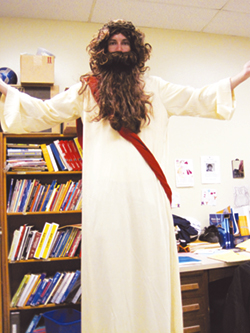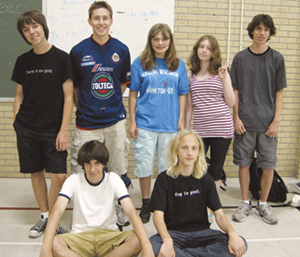 I’m not gay. I’m not Jewish. I’m not a woman. I’m not black. I’m not overweight. I’m a middle-class, white man, and I didn’t experience discrimination in my life until I began telling people that I’m an atheist.
I’m not gay. I’m not Jewish. I’m not a woman. I’m not black. I’m not overweight. I’m a middle-class, white man, and I didn’t experience discrimination in my life until I began telling people that I’m an atheist.
I’m a bilingual science teacher and the faculty co-adviser of the West High School chapter of the Freedom from Religion Foundation in Madison, Wis. Aaron Blom, a math teacher, and I agreed to advise the club because of our experiences as teachers and because of our experiences of feeling marginalized in this “Christian” nation.
We do not dwell on how we feel marginalized. We are educated adults, and we are comfortable and confident in our identities. We are not intimidated by people who do not approve of our position on religion. We are concerned with the well-being of the students who question religion and the value society places on religious faith. They are young, often unprepared to hold their ground in a verbal dispute and trained by society to trust and submit to adults. They may even feel physically intimidated by other students and adults, and they seek the approval of adults and the acceptance of their peers. They are the ones most affected by the abuse by Christians.
 A great student member left the club this year because his religious friends were offended by his membership in the club. This exemplifies the pressures that many of our student members unfortunately face. We believe that it’s especially important to support students who are members of groups that have historically been discriminated against.
A great student member left the club this year because his religious friends were offended by his membership in the club. This exemplifies the pressures that many of our student members unfortunately face. We believe that it’s especially important to support students who are members of groups that have historically been discriminated against.
West High has a Black Student Union, a Gay-Straight Alliance and now, in its first year, a club for nonbelievers. Our mission to support, inform and inspire students is reflected in the club’s three goals:
• To support students who choose to break away from the religion in which they were indoctrinated.
• To inform students of the dangers of religious dogma.
• To inspire students to accept personal responsibility for making their lives rewarding and meaningful.
The club meets on Mondays during the lunch hour. Topics have included educating students on arguments against religious dogma so that they can engage intelligently in discourse on the topic, understanding morality as a rational thought process, current events such as the recent National Day of Prayer court ruling, and science education such as germ theory and evolution by natural selection.
In part because atheists are, according to polls, the most-hated group in America, many atheists simply keep their nonreligious positions to themselves. I understand how much easier this approach makes one’s day-to-day life, but I believe that silence further alienates young nonbelievers.
It’s important for nonbelievers to be open about their feelings. A number of West High faculty and staff have initiated conversations with me concerning their skepticism. Parents have e-mailed me to express their happiness with the club. One parent said, “It is so important to expose young minds to the concept of a meaningful life free from the dogma of religion.”
I appeal to these adults to stop into our club meetings to say “hello” and, at the least, tell students they approve of what we’re doing. One West teacher did just that and spoke at one of our meetings, where he expressed support for separation of church and state, praised students for their work and encouraged them to take his course “the bible as literature.”
Take this hijab and shove it
Christian hegemony in America is a constant reminder that our club’s work is far from done. Public schools do, for the most part, foster students’ ability to think rationally and demand evidence while evaluating the validity of a claim.
But at the same time, students are bombarded, at school and outside of school, with the message that religious belief is a good thing. The number of pro-religion ads that we are exposed to daily is staggering. Even in liberal, educated Madison, I see billboards advertising churches, church buildings with signs and crosses, people wearing rosaries, Christian crosses and Stars of David.
I see a Muslim teacher (a convert) and a handful of Muslim students wearing hijabs, bumper stickers for “Life 102.5 FM” (a religious radio station), a West High custodian wearing a “Got Jesus?” T-shirt, “Jesus fish” on cars, anti-abortion protesters wearing their religion on their sleeves outside the clinic at 1 South Park St., Hispanic students wearing shirts depicting the Virgin Mary and the Virgin of Guadalupe and Jesus Christ (complete with a bloody crown of thorns), professional fighters with religious tattoos and interviews with athletes who thank God every time they get near a microphone.
These perpetual reminders of the power that we are opposing make me feel that we are behind in the battle to reach students with explicit dialogue against religious dogma. The Child Evangelism Fellowship’s Good News Club (an attempt to reach children in public schools so they “hear the Gospel and learn the truth from God’s word”) claims to have over 3,400 clubs reaching more than 119,000 students each week. In addition to the students whose intellect is attacked at public schools, add the number subjected to churches and “educational” classes (e.g., CCD) by adults they trust.
Our club, on the other hand, is composed of around 15 regular attendees and is the center of its share of controversy at the school. As a way to further the freethought cause and reach students and adults who do not attend our meetings, we began our biggest project of the year. We applied for grant money, raised funds and received a donation from the Freedom from Religion Foundation.
On Feb. 12, 2010 (Charles Darwin’s birthday), we celebrated the opening of West High’s first “Freethought Collection.” It currently has 25 books, seven DVDs and three audio books on CD and is housed in West’s school library. The collection is available to everyone, and the school is responsible for checking out materials and issuing “obligations” if something isn’t returned in the same condition in which it was checked out.
In West’s student newspaper, The Regent Review, I suggested to readers that they read Sam Harris’ Letter to a Christian Nation for its unintimidating length, compelling content and matter-of-fact humor. I also promised that it would “change their lives.”
Another central focus of our cause is to get adults to stop lying to children about the meaning of life (who says there needs to be one?) and what happens after death. The same Good News Club brochure, which, by the way, I received from a silver-haired, pleasant, grandma-type at my daughter’s public elementary school at a back-to-school carnival, had the following statistic: “Likelihood of various ages choosing Christ as Savior: ages 5-13, 32%; ages 14-18, 4%; ages 19 or older, 6%.” I joked at one of our meetings that the same statistic could apply to the likelihood of accepting candy from a stranger.
You can follow the club, offer feedback and participate in online discussions on facebook.com — “Freedom From Religion Club.”

